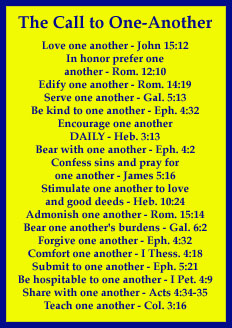The Spirit of Family: Living in the Relational Church – Part 3
By Wayne Jacobsen
BodyLife • September 2000
 No matter how independent we humans may try to be, there are times we can’t help wanting to share with others.
No matter how independent we humans may try to be, there are times we can’t help wanting to share with others.
Special moments are like that. Over the past few months as Sara and I have walked along the beach, we’ve watched a pod of dolphins play in the waves, even body-surfing into the shore. We couldn’t help point them out to total strangers and stand there sharing the moment with them. It has been so incredible that I think we’ve also told it to just about every human being we’ve met.
We also enjoy having others around when we feel threatened, uncertain or in need of direction. The first time Sara and I tried to hike to Walling Lake in the Kaiser Wilderness, we weren’t certain at all if we were on the right trail. Imagine our joy at finding another group of hikers coming down that same trail. We were able to confirm our bearings and they were able to warn us of a marshy area ahead that was filled with mosquitoes so we could get our insect repellent on before we became their lunch.
And one of the things I least like to do alone is move, paint or pour cement. I don’t know how I would have gotten our triple dresser to the second-floor without some dear friends and family who helped us move. As much as I hate to do it myself, I also hate anyone else left to do it on their own.
Sharing special times, sharing information to help others along the way and sharing resources to help lighten the burden on someone’s shoulders… I can’t imagine a better description of what it means to be part of God’s family. Why doesn’t it always work out that simply?
The Longing for Family
Maybe you’ve shared something special God showed you, only to have someone else dismiss it even as they tried to top it with their own discovery, or even worse tried to tell you how yours was flawed. Perhaps you’ve asked for help, only to have people ignore your pleas or send you down the wrong road, promising a reality you could never find. And in our day, fellowship has often become less about lightening another’s load as weighing others down with demands and expectations.
Is that why we live in a jaded age where many believers will only gather consistently to enjoy a polished performance; or else they retreat to themselves, doing the best they can on their own? Both options save us from having to get involved with anyone beyond a superficial level and rob us of one of the most incredible facets of being God’s child—life as a part of his awesome family.
The reason broken relationships in our own earthly families hurt so deeply, and why even in the face of such pain people still have an insatiable longing to be linked to family is because God created us for it. Unfortunately, the body of Christ in our day has not had much better success finding a healthy family life. Many come away from experiences in the body of Christ crushed by the disappointed desire to find real community, caring and involvement, where every member has a significant place and every person is valued.
Unfortunately today, institutional priorities are usually the guiding force of the shared life of believers. We have blindly accepted their demands while failing to realize that those priorities are the opposite of family. Instead of celebrating diversity and authenticity, or making room for people to be at different places in the journey, they are pressed into conformity. Smooth running programs are championed above building healthy relationships and the gifts of a few are exalted instead of unlocking the gifts of all. Institutions exist to secure their own preservation, rather than to embrace God’s wider work in the world and genuinely serving those who do not know him. It’s no wonder that these dynamics have proven more successful at entertaining crowds than nurturing Father’s family.
Forgetting What’s Behind
Anyone who has been involved in institutionalized Christianity knows how quickly the relationships of the most well-intentioned become filled with some of the very deeds of the flesh Paul outlined in Galatians 5: … “hatred, discord, jealousy, fits of rage, selfish ambition, dissensions, factions and envy.” We can get caught up in those very actions even while thinking we are doing God’s will.
When the pain gets too intense, a faction breaks off to start a newer, better body. In a matter of years they are overtaken by the very things from which they fled. After a few experiences like this it’s no wonder many believers give up hope of ever finding vibrant body life.
But Father beckons us past our hurts and disappointments. I’ve heard horror story after horror story of people being exploited and manipulated by those who claimed to have God’s interests at heart. They were asked to defy their deepest convictions in the name of ‘love’ and ‘unity’, and when they would not, were vilified and excluded. As excruciating as those experiences can be, I still hear them hungering for real connections with other believers.
But for them to experience real body life they will have to follow their hunger even beyond their hurts and reactions to past failures. Perhaps it will help to realize that even though we were believers trying to follow God, those relationships may not have been built on the real spirit of Father’s family. Often they are focused more on what we felt we needed to get from others, not on what he freed us to give others.
It is easy to look at ourselves as victims and others as villains, when the truth is rarely that simplistic. Yes, you were probably manipulated by others, but isn’t it also true that we did some of our own manipulating? We expected people to act in certain ways and were disappointed when they didn’t. When we tried to get them to do it our way, we often resorted to tactics that Jesus never asked us to use.
Why? Because it is in our fallen nature to use organizations when they meet our needs and to abuse them when they don’t. In other words, the reason the spirit of family often decreases in proportion to the growth of an institution that tries to contain it, is because people begin to view it as the way to get their own needs met and their own preferences satisfied.
One former pastor I know defines institutionalized religion as the mutual accommodation of self-need. One has a need to teach, another to be taught. One has a need to lead worship, another to have a worship experience. One has a need to shepherd others, another a desire to put their responsibility on someone else. When our needs brings us together, we will both be exploited as well as exploit others. It is no wonder that this approach fails to nurture an environment where people can live together as God’s family.
One Anothering
 Thus the root of the problem is not our institutions, but our own self-needs and our attempts to get other people to fill up in us what we lack in our own relationship with God. You can almost find Scriptures to underscore that mistaken notion because God clearly works through others as the extension of his own hand. But that doesn’t mean that Jesus builds his body based on our self-needs. Far from it!
Thus the root of the problem is not our institutions, but our own self-needs and our attempts to get other people to fill up in us what we lack in our own relationship with God. You can almost find Scriptures to underscore that mistaken notion because God clearly works through others as the extension of his own hand. But that doesn’t mean that Jesus builds his body based on our self-needs. Far from it!
He builds family life only out of our relationship with him. As the Lord of Lords, the Head of the church, and the Savior of the world, all of our needs can only be dealt with in him. If they are legitimate he will meet them. If, instead, they are merely the tyrannical ravings of our flesh, he will want to set us free of them. Only when we get that straight are we ready for the kind of family life Jesus envisioned for us.
As we learn to trust him for everything—our fulfillment, our direction, our righteousness, our ministry, our resource—we can finally begin to share healthy relationships with other believers. Because our eyes are on Jesus to bring his life to us, we no longer have to manipulate others to get what we want. Though he will often use other believers to do that, he will rarely use ones we expect it from.
That’s why the Scriptures paint a far different picture of body life than we see today. It does not envision large institutions with hired staff and cumbersome overhead. Instead it depicts a group of people who are growing together to listen to Jesus; who intentionally and freely learn to share their lives without manipulating each other. The only body life the early church understood was the care, wisdom, and encouragement that people would share together in the reality of life.
They would not have conceived of the church as people lined up in chairs. Instead they saw it as the whole body engaged in sharing special moments, helping each other on the journey and finding ways to lighten someone’s load. That’s why the life of the early church can be summed up in the ‘one another’ Scriptures laced throughout the New Testament. (See list at right.)
This is how they saw their engagement of the Father’s family. Christ-centered friendships spilled over in acts of compassion and service through the daily course of human life. The body flourished only as each person was free to grow in Christ and valued for the gifts and insights they brought to the body. It was not a group of people that needed to be managed or entertained; but a family who could mutually share in God’s life. No one needed to lord over the others. No one needed to feel spiritually inferior. Instead, they looked to Jesus to meet their needs, and lived intentionally to put others’ needs on par with their own.
Freely Receive, Freely Give
Notice we don’t come to the body to get what we’re not finding in Christ. That’s backwards. We bring to the body the fullness of our relationship with him. That’s why Jesus didn’t tell us to “get love from one another” or to “get service from others”, but for us to “love one another” and to “serve one another”. It’s not what we expect from others that allows us to experience body life, but by that which we intentionally give.
Jesus expressed it to his disciples this way: “Freely you have received, freely give!” Received from whom? Each other? No, they share what they received from him. I like the way The Message translates that portion: “You have been treated generously, so live generously.”
I love that because it puts things in their proper order. I can’t be generous until I’ve experienced in a daily way God’s generosity for me. And, where I’ve experienced his generosity, I can’t help but treat all others around me in the same way. The saddest believers to me are those who never seem to discover that generosity. Because they live on their own resources or expectations instead of embracing his life wholeheartedly, they come to view God as a meager God. They never have enough time and energy for themselves, much less be able to take an interest in others.
However, when we fill up on God’s incredible love for us and embrace his purpose in us, we don’t have to make other people its substitute. As people like that find each other along the way, something incredible happens – family! I’ve been picked up at the airport often by total strangers and by the time we get to their house feel as if we’ve known each other for a long time.
Friends on the Adventure
I honestly think if we worried less about trying to find ‘a church’ or trying to start a new one, and simply learned to live in Father’s love while intentionally looking for opportunities to share that with others, that we would find ourselves in the midst of church every day.
The problem for many is that the life of trusting God is peripheral to their lives, and thus relationships with believers that are mutually-encouraging and edifying are as well. We think just because we sit in the same room with believers regularly and call it ‘family’ that we’re experiencing the fullness of it. The truth is, we probably haven’t even begun.
Let God become the sole source of every desire and need in your life. Go on the adventure of learning to trust him and you’ll soon find him connecting you with other believers who are on the same journey. It will be just like meeting other hikers in the back country. There will be immediate rapport, a willingness to share what you’ve experienced to help others, without the desire to force others to do what you’re doing.
If God leads you to, find ways to get together and discover how to take an interest in each other. I can’t emphasize enough that this is an intentional choice to engage the family pro-actively and become an active participant in helping others. It doesn’t just happen while we sit at home and twiddle our thumbs or sit in a service and watch the minutes tick by until the sermon ends. It happens as people go on an adventure with God and actively look to participate in other people’s lives as an encourager in the journey.
Where you hear of other believers near you sharing a similar passion, go check it out. I’ve been at a couple of gatherings this past summer where people chose to come great distances just to meet others who were on this kind of journey. If there’s a group of you already trying to do that and feeling like it’s falling short, ask someone to help you talk it out together and hear what God is saying.
There is nothing like the kind of relationships that allow us to share special moments, to help people further along in God’s life and to lift the burdens in this life that weigh us down. It’s not nearly as difficult as you might think, and the joys are indescribable.
After all, its what he made you to be a part of!
Download Article:
- Download Article PDF (204 KB)
OTHER TRANSLATIONS
- Tamil Translation (PDF 82 KB)




